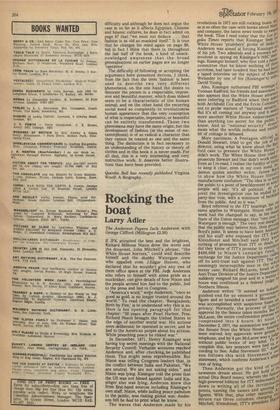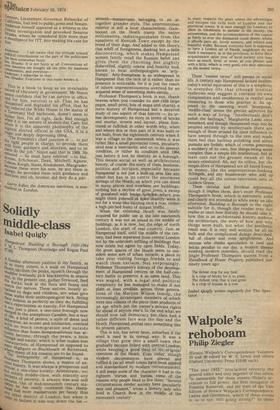Rocking the boat
Larry Adler
The Anderson Papers Jack Anderson with George Clifford (Millington E2.50)
If JFK attracted the best and the brightest, Richard Milhous Nixon drew the worst and the dreariest. John Mitchell's phrase, "the White House horrors," could well describe himself and the shabby Watergate crew who appalled even J.Edgar Hoover, who declared that he wouldn't give any one of them office space at the FBI. Jalk Anderson who refers to himself with some pride as a muckraker, can give details of how Nixon and the people around him lied to the public, lied to the press and lied to Congress.
"America's word," write Anderson, "once as good as gold, is no longer trusted around the world." To read the chapter, 'Bangladesh; Birth by Fire,' is to understand why this is so. Here is his opening paragraph for that chapter: "30 years after Pearl Harbor, Pres. Richard Nixon brought the United States to the edge of another world war. His actions were deliberate; he operated in secret; and he lied to the American people about his actions. While preaching peace he risked war."
In December, 1971, Henry Kissinger was having top secret meetings with the National Security Council. Verbatim accounts reached Anderson and, after checking, he published them. This might seem reprehensible. But Nixon was telling Congress leaders that, in the conflict between India and Pakistan, "We are neutral. We are not taking sides," and Nixon was lying. Kissinger told the press that the US was not biased against India and Kissinger also was lying. Anderson knew this from first-hand sources including Kissinger's own staff. Nixon, while ladling peace pabulum to the public, was risking global war. Anderson felt he had to print what he knew.
The waves that Anderson made by his
opecba,bor February 16, revelations in 1971 are still rocking boats. Ad! as is so often the case with books about Nix° and company, the latest news tends to sviaal the book. Thus I read today that the Los kri geks Times reports that Kissinger feels 0,e White House `plumbers' probe of leaks Anderson was aimed at forcing Kissinger 0,119 of his job. Two admirals and a yeoman vie, involved in spying on Kissinger's NSC meetf ings. Kissinger himself, who first told a Sena" committee that he knew nothing of thesed activities, had later to edmit that he had beLr a taped interview on the subject of Adolf; Welander by one of his (Kissinger's) David Young. Also, Kissinger authorised FBI wiretaps Yeoman Radford, his friends and associatesl also appears that the White House attorneYd were referring to Radford when they as,.ktepe both Archibald Cox and the Ervin Co" not to probe matters of "national securk;s But it's all coming out anyway and it seet more another White House embarrassille'to than anything too secret for the publica-1 know. And so "national security" mean what what the worlds indicate and anothe bit of coinage is debased. More nastiness. A Pentagon official, Donald Stewart, tried to get the job of ri3d director, using what he knew about the Pp ford case to pressure the White House' ,0 didn't work. The White House then tried `r prosecute Stewart and that didn't work eitile,0 Even as I re-read, I realise the futility of trY, to keep it clear, even in my own mind' derson quotes another writer, James to show how the White House literal., manufactures confusion: "The idea is to brl,c'ti the public to a point of bewilderment at people will say, 'it's all political.' point the investigation can be ended .5, party-line vote, with a minimum of baouP.from the public. And so it was." , bilt Boyd referrred to the ITT hearings ths same applies to Watergate. Nixon only lani week had the chutzpah to say, in his nt o State of the Union message, that "one Watergate is enough." The very real dang'in that the public may believe him, thus PO% Boyd's point. It seems to have been Anderstid. and his staff who exposed the ITT fLaneo Kleindienst and Mitchell said they Is"no nothing of 'pressures from ITT or deals,. did they know of ITT's promise to contribil $400,000 to Nixon's campaign fundilio exchange for the Justice Department ca on off its anti-trust suit against ITT. The koli seemingly incorruptible man in the messy case, Richard McLaren, head 01 ent Anti-Trust Division of the Justice DePartrnr suddenly resigned his post and in a matte co hours was confirmed as a federal judge Northern Illinois. Anderson writes: "It seemed an inu" guished end for so eminent a governill.,, figure and so heralded a career. Moreoveio was accomplished with suspicious hasteA.cio privacy. Normally, the process of (01 approval by the Senate takes months. 1311 compressed stehd e entire 4 n privacy. Normally, the process of (01 approval by the Senate takes months. 1311 compressed stehd e entire 4 n e conformn riast At tprnocoeosos to onipt-r tfcl December 2, 1971, the nomination was ser!",o, the Senate from the White House, hearltV were waived, key approvals were gotten e telephone, and by 4 pm McLaren was a .0.1°To, without public notice of any kind. 14° ac. complish this, key senators were lied Me cording to Sen. Adlai Stevenson ILL" Allowf son follows this with Stevenson 8110g0 statement, which confirms Anderson's 0" tion of lying. Then Anderson got the kind of stc°t°h newsmen dream about. He got hold oLoto actual Dita Beard memo, wherein the ' high-powered lobbyist for ITT indiscreetiY•io down in writing all of the incriMinalof points, naming the names and 0061 Ail figures. With that, plus other materia derson ran three columns, chargillf,„,.014 Mitchell, Kleindienst, IT1"s president tic" Geneen, Lieutenant Governor Reinecke of California, had lied to public, press and Senate. Anderson himself appeared as a witness in the senate investigation and provoked Senator Hruska, whom he considered little more than
mouthpiece for ITT, into making his case for
Anderson: ... I am aware that the attitude toward 13°Iitical contributions on the part of the politicians c,}las been somewhat fuzzy. °en.. Hruska: It is not fuzzy at all. Conventions all over America are bought all the time by business curomunities, and everyone inderson: I subscribe to that.
en. Hruska: Everyone in this room knows it.
This is a book to keep as an invaluable record of chicanery in government. Mr Nixon seems confident that he can survive in office, and for him, survival is all. That he has cheapened and degraded his office, that he has reduced the White House to the status of
Tammany Hall backroom, doesn't seem to pother him. I'm all right, Jack. Bad enough wnenit is the answer of modern day Cain; but v/hen it is the apparent philosophy of the ,rughest elected official in the USA, it is a 'cam and deeply depressing thing.
, The President's chief junction is ... to put
'h
.e right people in' charge, to provide them ,Arith basic guidance and direction, and to let them do the job." Nixon said that in 1968. He referred — he must have referred — to HalcerPan, Erlichman, Dean, Mitchell, Agnew,
°!son, Krogh, Stans, Kleindienst, Macgruder: Hecause these were his men, he put them in
arge, he provided them with guidance and• Hirection and oh, brother, did they do a job!
Larry Adler, the American musician, is now Pe8i dent in London.



































 Previous page
Previous page